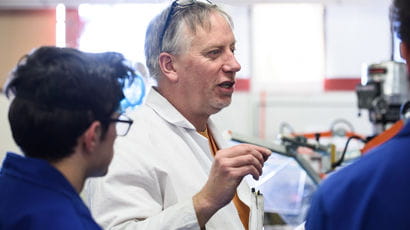Music festivals could reduce bat activity in some species by nearly 50 per cent

Researchers at the University of the West of England (UWE Bristol) have presented the first evidence of the negative impacts of music festivals on bat activity, finding loud music playback alone is enough to cause significant disturbance to several bat species. The researchers stress the importance of ensuring policy guidance keeps up with growing evidence on the impacts of human disturbance on local wildlife.
The academics found that even in the absence of additional anthropogenic factors commonly associated with music festivals such as lighting and habitat disturbance, loud music playback alone is enough to disturb several bat species. Their findings are published in the British Ecological Society Journal ‘Ecological Solutions and Evidence’.
Focusing on habitats that mirror the conditions of music festivals, the researchers observed declines in nightly bat activity along woodland edges of 47 per cent in Nyctalus/Eptesicus species when exposed to loud music. Even the more tolerant P. pipistrellus species activity decreased their activity by 32 per cent during periods of music playback.
Jack Hooker, a postgraduate researcher at UWE Bristol and lead author of the paper, said: “Our study is an important addition to a sparse evidence base detailing the impacts of this type of noise pollution on UK wildlife, that will hopefully aid the implementation and enforcement of policies relating to noise levels.”
Nocturnal species are heavily reliant on sound to glean important environmental information for many aspects of their life, including navigation, finding food, mating, and avoiding predation. Changing soundscapes can therefore hinder an animal’s ability to recognise and differentiate between important natural acoustic cues in their environment, disrupt social communication, and reduce the distance over which acoustic signals are perceived – reducing functional landscape connectivity and exacerbating impacts of habitat fragmentation (breaking habitats down into smaller, less connected fragments).
Most ecologists are aware of the damaging impacts habitat fragmentation has on our native landscapes, both on the ecosystems themselves as well as the communities that rely on them. However, research and planning policy often focuses on permanent alterations such as tree clearing or hedgerow removal, with more nuanced temporary disturbances being overlooked and requiring little to no mitigation when it comes to biodiversity protections.
Jack Hooker said: “Given that music festivals have become ubiquitous in the UK and are increasingly being held in places that are important for local wildlife, it is imperative that guidance relating to their planning and implementation is evidence-based and fully protects local biodiversity from any potential negative impacts if we are to share these habitats with wildlife in a sustainable manner.”
To assess the impacts of loud music on bat activity the authors considered 10 sites in South West England and South Wales between August and September 2021. Dark semi-natural landscapes located along woodland edges adjacent to grassland or pasture habitats were selected to resemble the conditions of UK festivals.
At each site, the experiment was conducted over two nights – a quiet (control) night, and a night with loud music playback at volumes reaching 100 dB comparable to noise levels at UK music festivals. Five common songs, each representing a different music genre and featuring different tempos and frequencies, were stitched together to produce ten minutes of music medleys. For two hours after sunrise, noise alternated between this musical medley (average volume 98.74 dB) and ten minutes of ambient background noise (average volume 42.82 dB). Bat activity was recorded at the woodland boundaries roughly 2m from the speakers, and at additional distances of 20m and 40m to study noise disturbance impacts at a range of distances and volumes.
Through this experimental approach Jack Hooker and their colleagues at UWE Bristol started to disentangle the impacts on bats of individual aspects of music festivals.
Jack Hooker stresses these findings are particularly important as real music festival scenarios include multiple music sources, playing consistently over a longer time frame and across wider ranges of habitats - all of which will likely emphasise the impacts on bats.
Dr Emma Stone, Lecturer at the Milner Centre for Evolution at the University of Bath, said: “Music festivals undoubtedly affect bat activity, but steps such as making quiet hedgerows available could really make a difference in reducing negative impacts.”
Looking to the future, Jack Hooker spoke of hopes of expanding the experiment to include a range of different habits and locations.
He said: “There may be additional environmental elements at play which may make bat species more or less willing to tolerate our late-night partying.”
Related news

18 December 2025
UWE Bristol professor appointed National Institute for Health and Care Excellence CEO
Jonathan Benger CBE, Professor of Emergency Care at UWE Bristol, has been appointed as the new chief executive officer of the National Institute for Health and Care Excellence (NICE).

17 December 2025
Findings revealed from first UK study into experiences of mothers who are survivors of rape pregnancy
UWE Bristol academics have revealed the findings of the first UK-based study of the experiences of mothers who are survivors of rape pregnancy.

11 December 2025
Social media influencer work is far more demanding than it looks, research finds
A study exploring the mental health impacts of social media influencer work has revealed that life online is far more demanding than it appears.

25 November 2025
UWE Bristol experts join film Q&A exploring music and melodrama
Academics will take part in the Cary Comes Home Festival, with a post-screening Q&A exploring music, melodrama and emotional storytelling in classic cinema.

17 November 2025
Urgent reform needed to support ambulance-delivered end of life care, study finds
More than three quarters (78 per cent) of paramedics sometimes fear doing the wrong thing when caring for people in the last year of life, new research has found.

13 November 2025
Bristol’s screen industry experiences “boom-and-bust cycle” after post-pandemic recovery, new research from UWE Bristol finds
New research from UWE Bristol provides detailed insight into Bristol's screen sector.

13 November 2025
New AI research to revolutionise animal welfare
A UWE Bristol research project will combine behavioural science and AI to create technology that understands not only what animals do, but how they feel.

10 November 2025
Lessons from Low Traffic Neighbourhoods will drive better public engagement, study finds
Lessons from Low Traffic Neighbourhoods have informed a new toolkit to improve engagement with the public on challenging local street issues.

06 November 2025
First-of-its-kind study aims to help more people spend their final days at home
A new study will explore how architectural design could support end-of-life care in domestic settings.

29 October 2025
UWE Bristol academic unveils breakthrough in energy-efficient AI at NATO science forum
Dr Jonathan Lancelot has developed a new form of AI that could transform how intelligent machines operate in space, defence, and remote environments.

15 October 2025
UK food needs radical transformation on scale not seen since Second World War, new report finds
A new report from the Agri-Food for Net Zero Network+ finds urgent action on food is needed if the UK is to reboot its flagging economy, save the NHS billions, ensure national food security, and meet climate commitments.

07 October 2025
Academic playing role in project to find hidden graves in Mexico using drone technology
A UWE Bristol lecturer is playing a part in a project using drone technology to locate concealed graves in Mexico.
You may also be interested in

Media enquiries
Enquiries related to news releases and press and contacts for the media team.

Find an expert
Media contacts are invited to check out the vast range of subjects where UWE Bristol can offer up expert commentary.
College of Health, Science and Society
The College of Health, Science and Society is a large, diverse and dynamic part of the University, bringing together experts from Health and Social Wellbeing, Applied Sciences, Education and Social Sciences

Research in the College of Health, Science and Society
Research centres and institutes in the College of Health, Science and Society at UWE Bristol. Find out what areas of research they focus on and much more.






